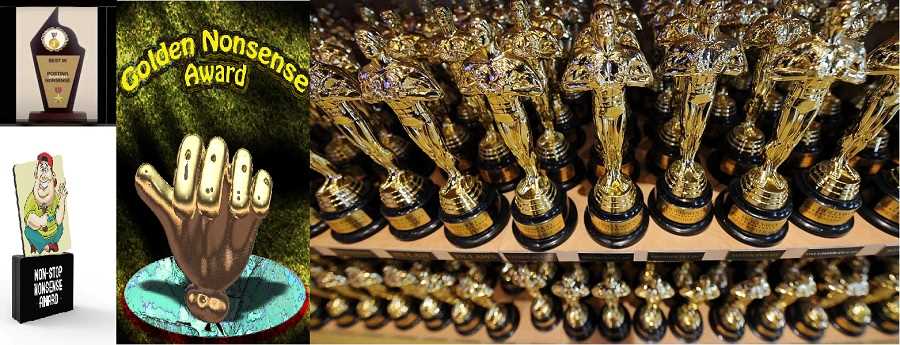
Tino Mapatya
It usually begins with an email. The language is persuasive and tends to go overboard in its congratulatory manner.
“We write to inform you that you have been nominated to receive an award as The Best Assistant Deputy General Manager for Networking in the Northern Region.
“You have been chosen from a list of your peers and this award is in recognition for your outstanding Assistant Deputy General Manager achievements.”
The email continues to list the reasons for your appointment.
The choice of job title from an early 2000s Nigerian film called “Borrow Pose” is deliberate to show the absurdity of the awards fever that is sweeping the nation.
Then comes the clincher… “In order to secure your place at these awards you will need to book a table…”
The financial component comes in and just like that, you are in line to buy yourself the right to update your LinkedIn profile with the line, “Award –winning Assistant Deputy General Manager for Networking”
In the 1990s there was a saying attributed to Nigerians. It went, “In Lagos, if you throw a stone in the air, when it comes down it hits a graduate.”
In Zimbabwe, now, if one were to through a stone in the air, chances are, when it comes down, it hits an award winner, or a multiple award winner.
The desire to win and to be the top name at something or the other has fueled a murky Awards culture in the country.
Anyone with an email address and the capacity to pay the required inducement walks away with an award.
It is highly lucrative.
Venues love it. They get to move otherwise dull menus and make use of conference rooms that would be lying idle.
Media houses make money from supplements celebrating the winners.
It has gone to ridiculous extents.
Some organisations are now hosting awards at town level, this week, followed by district level awards, then regional awards and finally a national awards ceremony, with the winners pumping out money each time.
Related Stories
The phenomenon has left many individuals loaded with more awards than they can display. Driving behind some branded vehicles in town will show the extent of the problem. “Best in this category… That of the Year… Most Outstanding 2nd Runner Up…” is blazoned brightly across the vehicles.
“We are witnessing a desire for validation among companies and individuals, which is manifesting in the payment for awards. We have people who are willing to do anything to get recognition, visibility and ‘likes’ so paying for an award is a simple task for them,” says Reginald Masiiwa, a sociologist.
“The organisers of these events have figured out that there are people in business who yearn to be called “The best” and who will gladly pay to collect an award with their name on it, without batting an eyelid,” he said.
Zimbabwe hosts several industry-specific awards. The Institute of Directors, for example, hosts Director of the Year awards, where deserving directors are honoured.
It is the same with the media, where the Zimbabwe Union of Journalists (ZUJ) hosts the National Journalism and Media Awards (NJAMA), recently held. Sportswriters hold awards for their industry as do Marketers and Personnel Management professionals.
Events like Zimbabwe Agricultural Society and Zimbabwe International Trade Fair (ZITF) give awards for specific categories and their judges and the criteria are clearly laid out.
These awards are clear in their process and are given to people who are excelling in their field. There is hardly ever an uproar once these are given and the criteria clarified.
The cash-for awards accolades has truly bitten deep. The way people rush to add these awards to their LinkedIn and Facebook biographies is worrying.
The relish with which they include these awards in citations to introduce themselves also speaks to the need for recognition.
“Some of these people maybe were not hugged enough as children. They need to be hugged now, on stage, by their own money and by the awards givers who are clearly onto a good thing. Pay for your hugs, it is probably good therapy,” said lifestyle blogger @Rapideyemovement.
At this rate, there will be fewer people without awards than those who have them. The real value of these awards has been stripped away by their sheer volume.
They continue to lose credibility by the day. Some of the award winners have given the awards back, or refused to pay for the dinner tables.
“I feel some regret. I should have just taken the award and found something to add to my CV,” says Andrea Mhlanga, who refused to pay for two awards from the same organisation.
Gashirai Gwande believes the awards are not worth the paper they are printed on. “These awards are a scam. They are of no value at all. Anyone who has followed the process of putting the awards together and the way invitations are sent will gladly walk away from these awards. Say no!” he said.
Try telling this to the joint Second Runner Up in The Assistant Deputy General Manager for Networking awards. He clutches his little glass trophy and framed certificate and dances a little dance after receiving the award.
His excitement is the motivation that the organisers need.
Next week he is receiving an email…




















Leave Comments